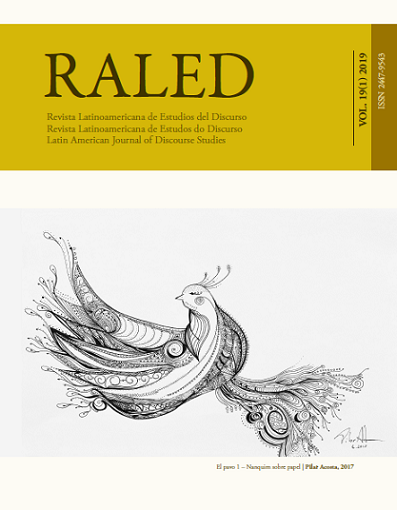Analysis of a foundational polemic
immigration, religion and economic development in the Argentine Constitutional Assembly of 1853
Keywords:
controversy. immigration. religion. Constitution. argumentation.Abstract
From the beginning of the independent period, the leading classes of Argentina faced the need to populate the vast national territory, and the incorporation of foreign inhabitants was from an early date the undisputed solution to that problem. However, despite the broad consensus that existed on the issue, there were divergent points of view about the “type of immigration” that was desired. In this context, during the debates of the Constituent Assembly of 1853, the treatment of the article 14 of the National Constitution gave rise to an argumentation situation (Plantin 2012) that raised the immigration issue when discussing freedom of religion. Supporters and detractors of religious tolerance linked this issue more or less directly with the foreign population that, it was hoped, came to populate the Argentine territory.Thus, in this paper the arguments put into play in this controversy are analyzed, to point out, on the one hand, the polarization and incompatibility of the positions in dispute (Angenot 2008; Amossy 2016) and, on the other, the starting points that are common on both sides of the debate. In this sense, we are interested in investigating the way in which these arguments construct the image of the immigrant, while offering certain representations about the local population and the idea of economic development.
Downloads
References
Amossy, R. 2016. Por una retórica del dissensus : las funciones de la polémica. En A. Montero (Comp.). El análisis del Discurso polémico. Disputas, querellas, controversias, pp. 25-38. Buenos Aires: Prometeo.
Angenot, M. 1982. La parole pamphlétaire: contribution à la typologie des discours modernes. Paris: Payot.
Angenot, M. 2008. Dialogues de sourds: traité de réthorique antilogique. Paris: Mille et une nuits.
Angenot, M. 2010. El discurso social. Los límites históricos de lo pensable y lo decible. Buenos Aires: Siglo XXI.
Bein, R. 2004. La legislación político-lingüística en la Argentina. En G. Kremnitz & J. Born (Eds.). Lenguas, literaturas y sociedad en la Argentina. Actas del Coloquio Internacional. Viena: Ed. Praesens.
Di Stefano, R. y Zanatta, L. 2000. Historia de la iglesia argentina. Desde la Conquista hasta finales del siglo XX. Buenos Aires: Gijalbo.
Di Tullio, Á. 2010. Políticas lingüísticas e inmigración. El caso argentino. Buenos Aires: Eudeba.
Gil Villegas, F. 2011. Introducción del editor. En M. Weber, La ética protestante y el espíritu del capitalismo. México: FCE.
Halperin Donghi, T. 1976. ¿Para qué la inmigración? Ideología y política inmigratoria y acelera-ción del proceso modernizador: el caso argentino (1810-1914). Jahrbuch für Geschichte von Staat, Wirtschaft und Gesellschaft Lateinamerikas 13: 437-489.
Löwy, M. 1999. Guerra de dioses: religión y política en América Latina. México: Siglo XXI.
Löwy, M. 2015. La ética católica y el espíritu del capitalismo. Una lectura weberiana de la teología de la liberación. En A. Morcillo Laiz y E. Weisz (Eds.). Max Weber en Iberoamérica. Nuevas inter-pretaciones, estudios empíricos y recepción. México: FCE, CIDE.
Montero, A. S. (Comp.). 2016. El análisis del discurso polémico: disputas, querellas y controversias. Buenos Aires: Prometeo.
Plantin, C. 2012. La argumentación: historia, teorías, perspectivas. Buenos Aires: Biblos.
Rosa, J. M. 1963. Nos, los representantes del pueblo: historia del Congreso de Santa Fe y de la Constitución de 1853. Buenos Aires: Huemul.
Rosal, M. Á. 2008. La religiosidad católica de los afrodescendientes de Buenos Aires (siglos XVI-II-XIX). Hispania sacra 60(122): 597-633.
Downloads
Published
How to Cite
Issue
Section
License

This work is licensed under a Creative Commons Attribution-NonCommercial-NoDerivatives 4.0 International License.
The authors retain the copyright and guarantee RALED the right to be the first publication of the work as well as a Creative Commons Attribution License that allows others to share the work with recognition of authorship and the initial publication in this journal.




